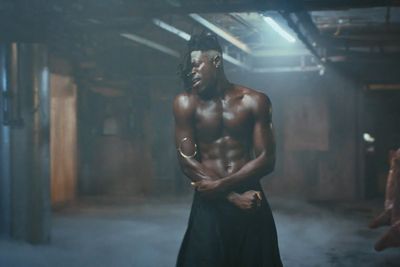Moses Sumney Embraces Complexity on "grae: Part 1"
Moses Sumney's "grae: Part 1" contains a kaleidoscope of sounds and meanings.

Moses Sumney's recentPitchforkcover story might've proclaimed that the musician is on his way to becoming a superstar, but his new album grae: Part 1 indicates a desire to avoid the algorithm-friendly mainstream.
That's not a bad thing. Experimental and rigorous, at times angular and at other times soft, grae: Part 1 often feels like it's trying to jump out and touch the listener, and it demands (and deserves) full-body attention. Songs like "Gagarin" deserve to be fully experienced—given the chance, that track reaches multiple senses, if not multiple dimensions. But played on the radio or on laptop speakers at a party, it might easily dissipate into the winds of distraction.
grae works sort of like a prism, refracting light in places, casting shadow in others, expanding and revealing its full spectrum when it meets the right light source. It's fragile, delicate, and personal, ragged and resistant and never simple. Instead, both in terms of its orchestration and Sumney's own virtuosic voice, it always feels on the verge of coming apart, peeling open or fragmenting like ice on a warm winter day. His falsetto, hoarse and warbling, can be jarring at times, and often the music is equally complex and resistant to immediate palatability. "Neither/Nor" embodies this complexity; it builds up to a wildly intricate climax, glittering with layers of harp and synth and pounding drums and aggressive basslines. Throughout the whole album, Sumney never stands still, despite the quietness and precision of his arrangements.
The lyrics sometimes grow abstract and mind-bending, warping like time does when you're lost in a new city or stuck in a moment. "Hollow as a hallway, Your fist fits right through me," sings Sumney on the final song, "Polly," which is as dismal as they come—Sumney is literally asking to dissolve, and the music mirrors this, growing so gossamer-thin that it nearly disappears entirely.
At other times, Sumney insists on largeness. The album's maximalism and its hall-of-mirrors-like multidimensionality seem to have been part of its central purpose. On the song "also also also and and and," Sumney speaks the line, "I insist upon my right to be multiple. I insist upon the recognition of my multiplicity… I am aware of my inherent multiplicity, and anyone wishing to meaningfully engage with me and my work must be too," he says, his voice refracted through a robotic effect and over swirling saxophone. He repeats "multiplicity" over and over, and his voice echoes and grows into layers as a sultry beat clicks into place. It's an entrancing, if slightly esoteric, exploration of personal multidimensionality in a world that often asks us to distill ourselves down to one thing—one identity, one mistake, one purpose.
In "boxes," another spoken-word track, Sumney says, "I truly believe that people who define you control you. And the most significant thing that anyone can do—but especially black women and men—is think about who gave them those definitions, and rewrite those definitions for themselves."
Sometimes it's hard to tell if Sumney is defining himself or breaking down definitions, if he's pulling back a curtain or surrounding himself with thicker layers, if he's building up walls or letting us in. Of course, the presence of that obscure largesse might be the point in itself.